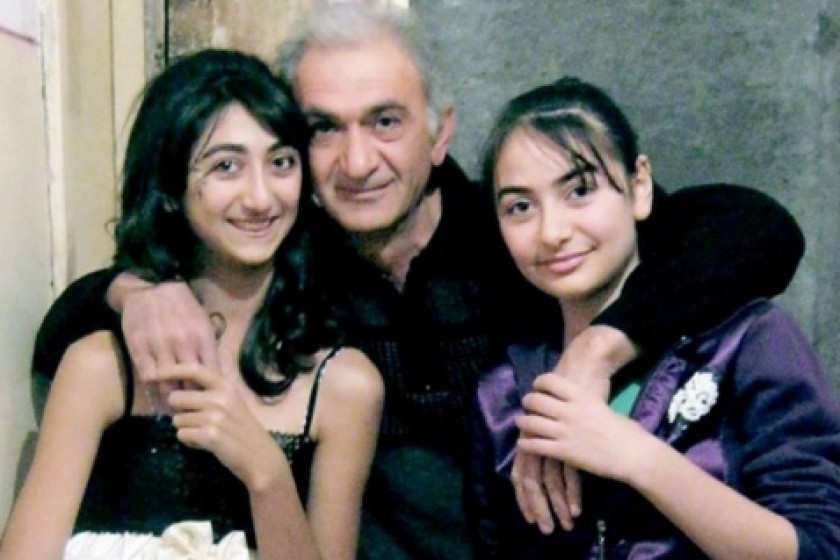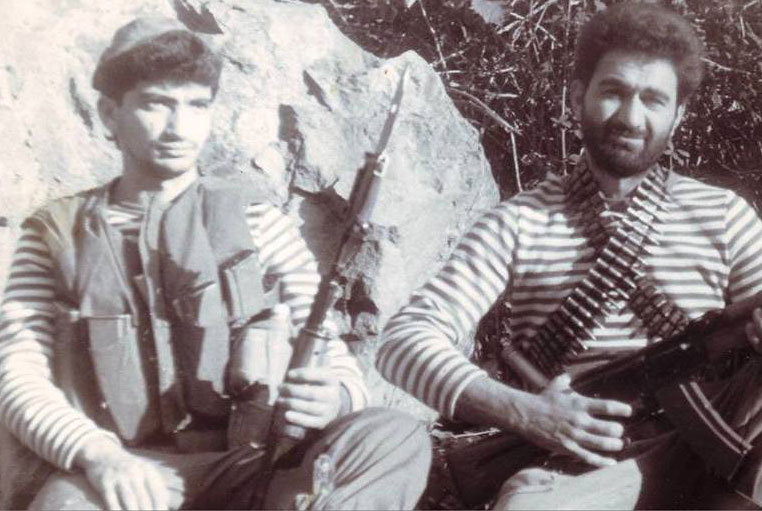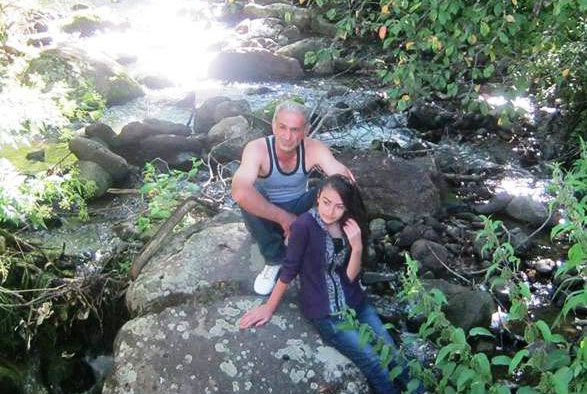
"Freedom-Loving" Man Arrested with Shant Harutyunyan was a Karabakh War Veteran
Albert Margaryan, one of the 14 people arrested along with political activist Shant Harutyunyan on November 5, 2013, has been in pre-trial detention at Nubarashen Penitentiary for the past 6 months.
The men were arrested ahead of an anti-government march led by Harutyunyan that led to clashes between activists and police. Several of the activists were arrested and accused of using violence against a government representative. According to some Armenian human rights defenders, Harutyunyan and those arrested with him are being persecuted for their political views.
Albert Margaryan (pictured below, from the right) is a friend of Harutyunyan's: their friendship spans 20 years and began during the Karabakh War, while both were in Kapan. Members of Albert's family — his wife, mother, and sister — described to Hetq the history of the friendship between the two men. "Together they have seen many difficulties, the death of their comrades-in arms, loss. People with the same concerns living with the country's problems are today in prison — one more patriotic than the other and attached to their land, their roots," says Albert's wife, Anna Margaryan, 48. The couple have two daughters, Roza and Anahit Margaryan, aged 14 and 15, respectively. Albert is a car mechanic by trade. Prior to his arrest, he worked in stone processing at a private workshop.
"Few in his circle [of friends] knew that my husband fought in the war. He doesn't like to bring it up; he says that it's every citizen's duty and not something to brag about. That's probably why no one has a war veteran certificate. Arrested with them, Misak Araqelyan, for example, left his studies at the [Yerevan] Polytechnic Institute and went to fight in the war; Vahik [Vahe Mkrtchyan] — at 15 years old. Vardan Vardanyan was the commander. Now they're all in prison," says Anna.
Albert's sister, Margarita Margaryan, in turn, said when she asked her brother if, god forbid, the war resumes, will he again go to defend his homeland, Albert said: "That is the duty of all of us." "We didn't know that in the 90s, he came and went with Misak to Armenia's border. Before the liberation of the Lachin corridor, he came and said he's going to go for a long time, but he didn't want our parents to be concerned, [so] he said I'm going on a vacation. It was only later that we found out that he participated in the liberation of the Lachin corridor. He saw a lot of things; he had changed unrecognizably after the war…. A calm, peaceful man; a good son, father, and husband," says Margarita, describing her brother.

"After March 1, 2008, whenever there was a march or demonstration, I would worry — and November 5 was no exception. Though Albert told me that it would be a peaceful march, I was worried. Then we found out from the internet and television that the boys were arrested. Naturally, Albert didn't come home that night, and at 7:30 in the morning they came to search our apartment. They were probably searching for weapons, but they didn't find anything and left," says Albert's wife. Then the family contacted the public defender's service since they can't afford an attorney. Anna doesn't work; together, they live in a rented apartment in the town of Masis, just outside Yerevan. Albert is the sole provider in the household — and he has not been working for the past 6 months. The family is now barely surviving.
Until the end of January, there was a ban on visits. And when after the hunger strikes and protests, the ban was lifted, family members would go to the prison once every 15 days to see Albert. "It's true, we see him on the other side of the double-pane glass window, but at least we see him," says Anna. Albert's mother, Rosa Margaryan, is unable to go see her son as her heart is weak — even sitting at home, when she hears his name, she gets upset. "I go to visit [Albert]; I return unrecognizable. Those around me already know that I've gone to the prison to see Alik [this is how they refer to Albert at home]… There was video footage online that has since been removed: there it shows how Albert obediently goes toward the police car — without displaying any resistance. Seeing this, the police officers leave Albert and go to the others. When I went to see him I asked, Alik, why didn't you escape? He said, what had I done for me to escape?" says Margarita, Albert's sister.

"The entire nation today wants systematic changes. There is no trust in the government. But we never thought about leaving the country, though I can't blame those who did. Now we see that there's no place for the rebellious, fighting type. I think, they're going to arrest the boys, so the others can see and think only about earning their daily bread, and not fight for their rights," says Albert's wife.
Albert Margaryan's mother told Hetq that she got angry, seeing on Armenian Public TV the story of an Azerbaijani family that had escaped to Armenia since human rights are violated in their country. "If only someone were to ask: Where are your freedom-loving children now? The freedom-loving boys were only demanding justice. What did they want? A calm, dignified life. What did you do with those people? You took them to Nubarashen prison. For the sake of what?" said Rosa Margaryan.
At the end, she appealed to the Armenian president: "What are you thinking, Honorable President, that you are keeping the boys locked up for so long? After all, each one is a beacon of light for a home, citizens of the Republic of Armenia, devoted to their country. God forbid, if again there is war in our homeland, they again will stand up guns in hand to defend the frontline."
 Videos
Videos Photos
Photos




Write a comment